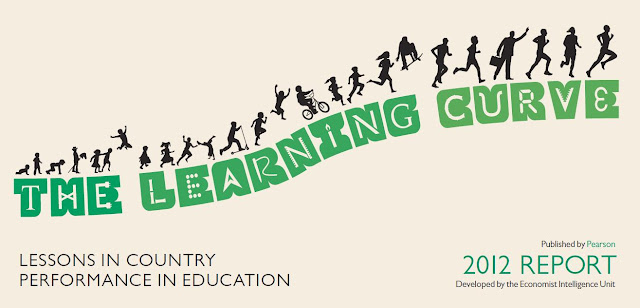Important Lessons from "The Learning Curve"
In this post, I would like to highlight a report developed by the Economics Intelligence Unit for Pearson. The report is entitled, "The Learning Curve: Lessons in Country Performance in Education". The report is an attempt to examine systems of education in countries across the globe in the hope of finding common factors that lead to better education outcomes. Countries are first ranked according to an index that takes into account cognitive skills and educational attainment. The Philippines is not among the list of countries included in the study, but it is safe to assume that the Philippines bears similar characteristics with the countries assigned to the lowest group in the study. (The lowest ranked countries in this study are Turkey, Argentina, Colombia, Thailand, Mexico, Brazil and Indonesia.)
Finland (1st) and South Korea (2nd) are ranked highest in the report while the United States is slightly above the median (ranked 17 out of 40). HongKong, Japan and Singapore are ranked 3rd, 4th and 5th, respectively.
In the search for meaningful correlations between various elements of education and favorable outcomes, clear answers are quite elusive. There are certainly some clear patterns like the fact that both Finland and South Korea have high regard for teachers but there are definitely more differences than similarities between these two education champions of the world. The report therefore begins with a clear and important admission:
 |
| To download the full report click http://thelearningcurve.pearson.com/content/download/bankname/components/filename/FINALLearningCurve_Final.pdf |
In the search for meaningful correlations between various elements of education and favorable outcomes, clear answers are quite elusive. There are certainly some clear patterns like the fact that both Finland and South Korea have high regard for teachers but there are definitely more differences than similarities between these two education champions of the world. The report therefore begins with a clear and important admission:
The main message of the lack of strong correlations, though, should be humility. Brian Stecher, Associate Director at RAND Education, says: “We use jargon that seems to explain student behaviour, but we really don’t understand the way students learn and the complex mix of inputs – family, community and learning – that lead to skills and temperaments. If you compare research in education to research in healthcare, you see a dramatic difference in our knowledge of cause and effect.” Claudia Costin, Rio de Janeiro’s Municipal Secretary of Education, adds that “Reforming education requires more than figures and analysis. You need to avoid arrogance and the feeling of having a technocratic approach.” (Learning Curve, page 17)The complexity of education perhaps arises from the fact that learning is a process. Therefore, its outcome correlates with input but the input does not necessarily determine the output. There is a process that occurs in between. Dr. Chester Finn, president of the Thomas Fordham Institute says, “Processes, more than inputs, are important. It is like having a good cook versus a bad one: the ingredients might be identical, but one produces something worth eating.” In the midst of such elusiveness of how various factors influence education, the report still manages to single out several important conclusions:
- Education reform requires both social and cultural changes. Society must value education. If a society chooses to idolize celebrities who cannot think critically, then education reforms will continue to fail. Education requires positive acknowledgement from society. Such respect is first made tangibly by treating teachers as professionals whose primary job is to mold the nation.
- All top performing countries in education have one thing in common: GOOD TEACHERS.
- There is no quick fix to education problems. Quality education requires a long term and consistent awareness and dedication to improve learning.
The central role of teachers in bringing quality education can never be overstated. Increasing teacher quality requires the following:
- Attracting the best talent to the profession. A country that is in great need of good teachers must identify promising individuals from students in secondary schools. This attraction can be made by granting scholarships for teacher education to these students and offering significantly higher starting salaries for teachers.
- Teacher training does not end in college. Teachers need ongoing training to keep pace with developments and share experiences with other educators.
- Teachers must be treated as professionals and not as technicians. They should not be merely dictated on what should be taught. Teachers must have sufficient autonomy and freedom so that they can tailor the instruction to the needs of their students.
- Autonomy and accountability require a delicate balance. This requires trust. The society simply must have faith in its teachers.
Unfortunately, based on the successful education systems around the world, none of the above would be sufficient on its own. All seem required for these elements corroborate and influence each other. Changing or defining a new curriculum is easy. Unfortunately, a new curriculum is not a solution. The real solution to education problems lies in the process, not the inputs. And central to this process is the teacher. Teacher quality is what makes education reform a difficult and long process.
Comments
Post a Comment